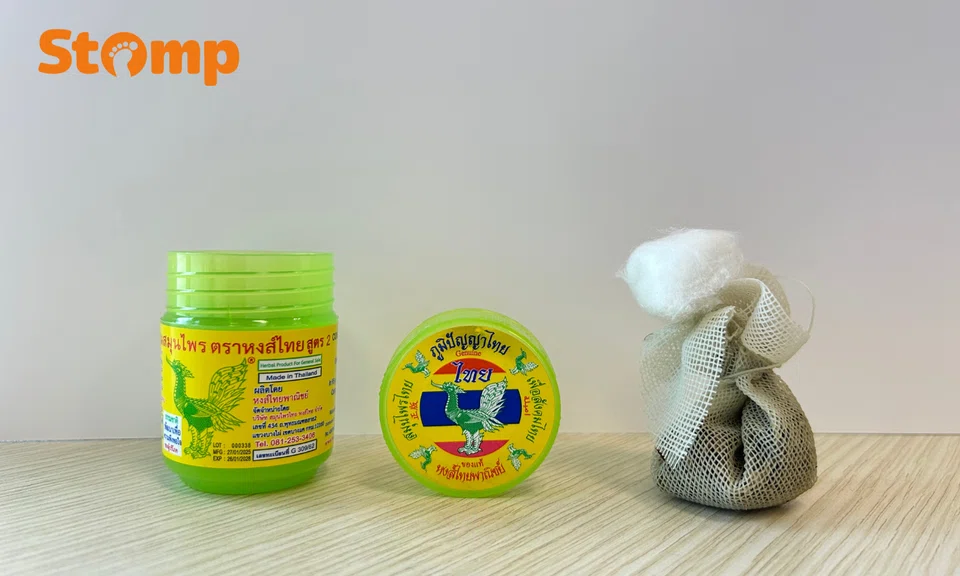'I use it almost every day': Why S'poreans remain hooked on the Hong Thai herbal inhaler despite recall
Farihan, a 39-year-old construction site manager, says he uses a Hong Thai herbal inhaler "almost every day".
He told Stomp that he recently bought a whole carton on a trip to Thailand and plans to stock up again in December.
But when it comes to hygiene, he draws a firm line.
"Sharing is a big no-no because bacteria from someone's nose can easily pass to another person if they use the same bottle," he said.
His daily habit comes amid a recent health warning from the Thai Food and Drug Administration (FDA).
What you need to know about the recall
Samples of the inhaler, made by Hong Thai Panich, were sent to the Department of Medical Sciences for testing.
The FDA said they violated the country's purity and quality standards.
In response, the company recalled Lot 000332, made on Dec 9, 2024, and expiring on Dec 8, 2027. The recall covers 200,000 units.
Hong Thai also pledged stricter production controls and said the contamination involved microorganisms that exceeded standard limits. However, the FDA has not yet specified the bacterial strain or provided details on potential health risks.
Days after the recall, Thai authorities seized over two million Hong Thai inhalers from illegal factories, local media reported on Oct 31.
Investigations revealed that while Hong Thai Herbal held a licence for one Bangkok facility, it had allegedly been producing items at another site without FDA approval, The Nation reported.
Associate Professor Koh Hwee Ling from the National University of Singapore's (NUS) Department of Pharmacy and Pharmaceutical Sciences said: "Some species of Clostridium may have bad effects on health, for instance causing botulism, tetanus, food poisoning, diarrhea, colitis etc".
Clostridium spp typically come from soil or the intestinal tracts of mammals, explained Associate Professor John Chen from NUS' Yong Loo Lin School of Medicine's Department of Microbiology and Immunology, who described the findings as "unsettling".
Why it's popular in Singapore
Despite the warning, Farihan said the inhaler remains popular because of Singaporeans' long-standing love of Thai products.
"We're already familiar with Thai stuff, especially their affordable fashion, snacks, and wellness products. So when something like this inhaler becomes trendy over there, it naturally catches on here too," he said.
Public relations consultant Annabel Lim, 37, uses it regularly, especially in enclosed spaces.
"We're often in closed environments here, in the office, MRT or bus, and sometimes the air can feel stuffy, with a mix of smells all around. Sniffing the Hong Thai herbal inhaler just makes the space feel fresher," she said.
When asked how the Thai FDA alert might affect her, she said: "If it's something serious like a safety issue, then sure, I'd stop. But for now, since my batch is safe, I'd probably still use it."
Farihan, however, expressed slight scepticism. "It doesn't really tell us what the actual health impact is. This product has been around for quite a while, and many people have been using it without reported issues."
Contaminated batches can pose health risks
Prof Koh said the Thai FDA's findings point to the presence of microorganisms that should not be in the product.
Using substandard or contaminated products, she added, can lead to respiratory infections, allergic reactions, or irritation to the airways and lungs — depending on how often and how the inhaler is used.

Prof Chen said the "high total aerobic microbial count" found by Thai authorities suggests poor hygiene or storage practices.
"Since the counts are high, it is likely the manufacturer did not use clean environments with air filtration to assemble the products," he added.
Both experts caution that sharing the product can increase the chance of infection or contamination.
"It's not a good idea," warns Prof Chen, as the inhaler's open design makes it prone to picking up saliva, nasal drips, or other microbes from users.
Keeping it for too long — especially in warm and humid conditions — could make things worse by allowing bacteria and fungi to grow.
The health risks are also magnified significantly if the user is elderly or immunocompromised, added Prof Chen.
How to stay safe
Prof Koh advised users to check that products:
- Are made under Good Manufacturing Practices
- Are approved by authorities
- Come from reliable sources
"Be extra careful about what you consume and use, especially if it is directly inhaled or ingested," she said. Anyone holding affected batches should "definitely" throw them away.
Assoc Prof Chen added: "Much like packaged food items, do not keep these too long after opening. The more times they are opened, the more they are exposed to microbes in the air — and also to the ones you might impart when using it."
In response to Stomp's queries, the Health Sciences Authority (HSA) said it is in contact with the Thai FDA to obtain more information.
"According to the product labelling, this herbal brand inhaler can be considered a Traditional Medicine, and is not subject to approval and licensing by HSA for their importation, manufacture and sale," an HSA spokesperson said.
Consumers who purchased the affected batch were advised to stop using it. HSA has also alerted e-commerce platforms Shopee, Lazada, and Carousell to the Thai FDA's announcement, requesting that they "conduct thorough checks on the availability of the affected batch on their platforms and remove the listings accordingly".
A Shopee spokesperson told Stomp the platform "works closely with the relevant authorities to ensure all listings on the platform meet local safety and compliance standards" and remains "committed to safeguarding the well-being of its users".

See something interesting? Contribute your story to us.


